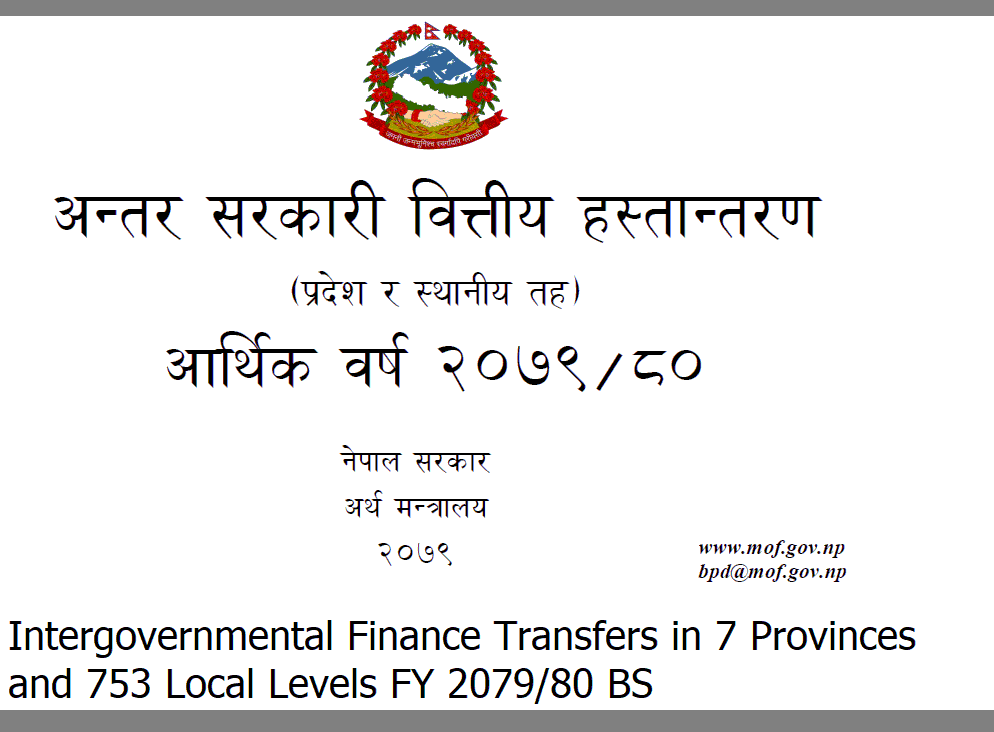
The government of Nepal, Ministry of Finance allocated a budget for intergovernmental finance transfer in 7 provinces and 753 local levels for the fiscal year 2079/80 BS.
An intergovernmental financial transfer is the exchange of finances between governments. In countries that have adopted a federal system, intergovernmental financial transfers are transfers of funds from one level of government to another or to the same level of government. With regard to the implementation of the rights of common nature provided by the constitution, one level of government transfers revenue and other grants to another level of government.
Financial transfers are usually provided by the upper government to the lower level government on a layered basis and in special cases, it also flows in parallel. Therefore, intergovernmental financial transfers are also economic coordinators promoting coordination and cooperation between governments.
The role of intergovernmental financial transfers in the implementation of fiscal federalism:
Financial federalism is the decentralization of economic rights. Intergovernmental financial transfers are one of the four pillars of fiscal federalism. The role that intergovernmental financial transfers play in strengthening fiscal federalism can be summarized as follows:
- To provide the necessary financial resources to the government close to the people to implement the rights,
- To create an environment of cooperation, coexistence, and coordination between the federal, state, and local levels,
- To make the federal government free to exercise its powers within its jurisdiction as a concept of financial federalism.
- To enable local governments to identify and mobilize the resources needed to identify and mobilize internal resources,
- To bridge the gap between local needs and the resources to meet them,
- To manage the necessary funds for the projects of pride under the responsibility of the federal government,
- To eliminate regional inequality and guarantee human rights through equalization grants,
- To reduce fiscal imbalance and develop proportionately, etc.
Overall, intergovernmental financial transfers have an effective role to play in making fiscal federalism sustainable, sustainable, and coordinated.
Arrangements for conducting intergovernmental financial transfers in Nepal:
The constitutional, legal, and institutional arrangements for conducting intergovernmental financial transfers in Nepal are as follows:
- According to the essence of Article 60 (2) (3) (4) (5) of the Constitution of Nepal, the federal government has provided financial equalization grants to the state government and local level and to the local level subordinate to the state government on the recommendation of National Natural Resources and Finance Commission. Arrangements have been made for distribution.
Similarly, in Article 60 (6), the Government of Nepal has made provision for the distribution of conditional grants, supplementary grants or special grants for other purposes provided by the Federal Reserve Fund.
- The National Natural Resources and Finance Commission has been set up as a constitutional body for determining the structure and recommendation of financial transfers. (Part 26)
- Intergovernmental Finance Management Act, 2074 BS: Provision has been made for detailed interpretation and facilitation of implementation of the provisions mentioned in the constitution.
- National Natural Resources and Finance Commission Act, 2074
- Procedure on Supplementary Grants, 2075
- Procedure for Special Grants, 2075
- National Natural Resources and Finance Commission
- Intergovernmental Finance Council: To have membership of state and local level representatives under the coordination of the Finance Minister
- Provincial Coordinating Committee: Under the convenorship of the Chief Minister and with the membership of the local level chief, deputy chief or chairperson, vice-chairperson
An intergovernmental financial transfer is a system of transferring financial instruments between the governments of the country subject to the law. It has played an important role in the effective implementation of fiscal federalism. Various provisions have been made in the constitution for its operation in Nepal. Institutional and legal arrangements have been made to facilitate the implementation of the constitutional provision.





